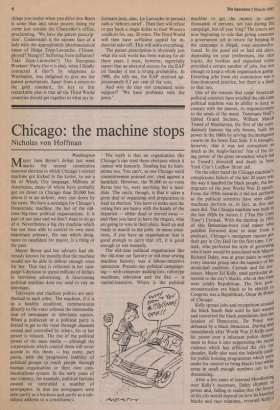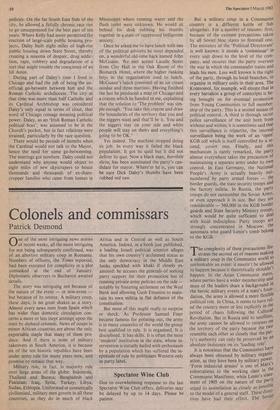Chicago: the machine stops
Nicholas von Hoffman
Washington
Mayor Jane Byrne's defeat last week marks . the second consecutive mayoral election in which Chicago's storied machine got kicked in the kyster, to use a bit of Windy City language. Millions of Americans, many of whom have probably got no closer to Chicago than 20,000 feet above it in an airliner, were cast down by the news. We have a nostalgia for Chicago's Democratic machine, the last of the old- time/big-time political organisations. It is part of our past and we don't want to let go of it. Nevertheless a big city machine which has not been able to control its own most important primary, the one which desig- nates its candidate for mayor, is a thing of the past.
Mayor Byrne and her advisers had ob- viously known for months that the machine would not be able to deliver enough votes for her. That fact is reflected in her cam- paign's decision to spend millions of dollars in television advertising. A functioning political machine does not need to rely on television.
Television and machine politics are anti- thetical to each other. The machine, if it is in a healthy condition, communicates directly to the voter without the intermedia- tion of newspaper or television station. When A politician or a political party is forced to get to the voter through channels owned and controlled by others, his or her power is vitiated. The rise of the political power of the mass media — although the corporations which control them will never accede to this thesis — has come, pani passu, with the progressive inability of political groups to reach people through human organisation or their own com- munications system. In the early years of our country, for example, political factions owned or controlled a number of newspapers. In that era newspapers were seen partly as a business and partly as a sub- sidised address to a constituency.
The myth is that an organisation like Chicago's can steal those elections which it cannot win honestly. Stealing has its limit- ations too. You can't, as one Chicago ward committeeman pointed out, steal against a landslide. However, the 30,000 or so votes Byrne lost by, were anything but a land- slide. The catch, though, is that it takes a great deal of organising and preparation to steal an election. You have to make sure the voting lists are heavy with the hands of the departed — either dead or moved away — and then you have to have the ringers, who are going to vote in their place, lined up and ready to march to the polls. In many situa- tions, if you have an organisation that is good enough to carry that off, it is good enough to win honestly.
The old-time political organisation like the old-time car factory or old-time sewing machine factory, was a labour-intensive operation. Present-day political campaign- ing — with computer mailing lists, robotype machines, television and the like — is capital-intensive. Where is the political machine to get the money to carry thousands of persons, not just during the campaign, but all year long? The courts are now beginning to rule that giving someone a government job in return for helping in
the campaign is illegal, even unconstitu-
tional. In the good old or bad old days, depending on your preferences, the race tracks, the bookies and organised crime provided a certain number of jobs, but not enough to keep a whole organisation going Extorting jobs from city contractors was a time-honoured practice, but there is a limit to that too.
One of the reasons that some American political scientists have extolled the old-time political machine was its ability to keep contact with the masses, its responsiveness to the needs of the many. Tammany Hall's fabled Grand Sachem, William March
Tweed of Manhattan, the first of the scan- dalously famous big city bosses, built his
power in the 1860s by serving the immigrant swarm on the lower East Side. It is thought, however, that it was not corruption as
much as the Anglo-Saxons' fear of the ris- ing power of the great unwashed which led to Tweed's downfall and death in New York City's Ludlow Street jail.
On the other hand the Chicago machine's conspicuous failure of the last 20 years was
the way it handled the black people, the im-
migrants of the post World War II epoch. From the 1950s onwards it did not perform as the political scientists have seen other machines perform or, in fact, as this one once did. The Chicago machine was built in the late 1920s by Anton J. (`Ten Per Cent
Tony') Cermak. With the election in 1931 of this Bohemian-born coal miner who
peddled firewood door to door from a pushcart, Chicago's immigrant masses got their guy in City Hall for the first time. Cer- mak, who perfected the style of governing which later would be associated with Mayor Richard Daley, was at great pains to weave
every interest group into the tapestry of his municipal coalition. Cermak and his suc- cessor, Mayor Ed Kelly, paid particular .at- tendon to the city's blacks, who at that time were solidly Republican. The first post reconstruction era black to be elected. to Congress was a Republican, Oscar de Priest of Chicago.
Kelly spread jobs and recognition around the black South Side until he had wooed and converted the black population into the loyaiest of Democrats. De Priest was defeated by a black Democrat. During and
immediately after World War II Kelly used his power over a reluctant police depar.1- ment to force it into suppressing the racial violence which has afflicted the city 1:Or decades. Kelly also used the federally paid for public housing programmes which Were under his control to bring blacks into white areas in small enough numbers not to be threatening. After a few years of internal bloodletting over Kelly's successor, Daley climbed to power and, failing to realise that the futulered of his city would depend on how he hand, blacks and race relations, reversed Kelly s
policies. On the far South East Side of the city, he allowed a fitfully chronic race riot to go unsuppressed for the best part of ten years. Where Kelly had never permitted the erection of large-scale public housing pro- jects, Daley built eight miles of high-rise public housing down State Street, thereby creating a miasma of despair, drug addic- tion, rape, robbery and degradation of a sort that might trouble the conscience of an Icli Amin.
During part of Daley's time I lived in Chicago and had the job of being the un- official go-between between him and the Roman Catholic archdiocese. The city at that time was more than half Catholic and its Cardinal Archbishop was considered Daley's only equal in terms of clout, that word of Chicago coinage meaning political power. Daley, as an 'Irish Roman Catholic political boss', was assumed to be in the Church's pocket, but in fact relations were strained, particularly by the race question.
There would be periods of months when the Cardinal would not talk to the Mayor, hence the need for some go-betweening. The meetings got nowhere. Daley could not understand why anyone would object to eight miles of new skyscrapers to house thousands and thousands of ex-share- cropper families who came from homes in Mississippi where running water and the flush toilet were unknown. He would sit behind his desk rubbing his thumbs together in a state of suppressed belligerent anxiety.
Once he asked me to have lunch with one of the political advisers he most depended on, a wonderful old-time hack named John McGuane. We met across Lasalle Street from City Hall in the Oak Room of the Bismarck Hotel, where the higher ranking boys in the organisation used to lunch. McGuane's lunch consisted of an ice cream sundae and three martinis. Having finished the last he produced a map of Chicago and a crayon which he handed to me, explaining that the solution to 'The problem' was sim- ple enough. 'You take this crayon and draw the boundaries of the territory that you and the niggers want and that'll be it. You and the niggers stay on your side and white people will stay on theirs and everything's going to be OK.'
Yes indeed. The machine stopped doing its job. In every way it failed the black population. It got its quid but it did not deliver its quo. Now a black man, horribile dictu, has been nominated the party's can- didate for mayor. Where'er he is, you can be sure Dick Daley's thumbs have been rubbed red raw.















































 Previous page
Previous page